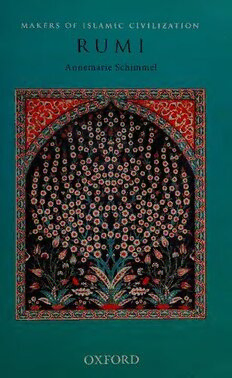
Rumi PDF
Preview Rumi
MAKERS OF ISLAMIC CIVILIZATION RUMI Annemarie Schimmel o o T o V o O boo AjOO® °0 £* °o 0 Oi jr \'* o c) 1 \ wD o &£ Q O & :*so. oo o o o m > In Ti fit izjm Rumi MAKERS OF ISLAMIC CIVILIZATION Series editor. Farhan A. Nizami This series, conceived by the Oxford Centre for Islamic Studies, is published and distributed by Oxford University Press (India). The books in the series, written by leading scholars in the field, aim to provide an introduction to outstanding figures in the history of Islamic civilisation. They will serve as the essential first point of reference for study of the persons, events and ideas that have shaped the Islamic world and the cultural resources on which Muslims continue to draw. Rumi Annemarie Schimmel translatedfrom the German by Paul Bergn Oxford Centre for Islamic Studies OXPORD UNIVERSITY PRESS OXPORD UNIVERSITY PRESS Oxford University Press is a department of the University of Oxford. It furthers the University’s objective of excellence in research, scholarship, and education by publishing worldwide. Oxford is a registered trademark of Oxford University Press in the UK and in certain other countries Published in India by Oxford University Press YMCA Library Building, 1, Jai Singh Road, New Delhi 110001, India © Oxford Centre for Islamic Studies 2014 This book is an English translation of Annemarie Schimmel, Rumi: Meister der Spiritualitdt, published by Herder Spektrum © Verlag Herder, Freiburg im Breisgau 2001 The moral rights of Annemarie Schimmel as Author have been asserted First edition published in 2014 All rights reserved. No part of this publication may be reproduced, stored in a retrieval system, or transmitted, in any form or by any means, without the prior permission in writing of Oxford University Press, or as expressly permitted by law, by licence, or under terms agreed with the appropriate reprographics rights organization. Enquiries concerning reproduction outside the scope of the above should be sent to the Rights Department, Oxford University Press, at the address above You must not circulate this work in any other form and you must impose this same condition on any acquirer ISBN-13: 978-0-19-809981-9 ISBN-10: 0-19-809981-9 Cover design: Grace Fussell, Oxford Centre for Islamic Studies Cover photo: ‘Turkish tiles’ © Orhan Cam /www.dreamstime.com Printed in India by G.H. Prints Pvt Ltd, New Delhi 110 020 esm W Contents Editor’s note Vll ix Foreword 1 1 Life and work 15 2 Mevlana’s poetical work 28 3 The religious foundations 30 4 Thoughts about God 55 5 Mevlana Rumi as teacher 85 6 The mysterium of love 96 7 What does Rumi’s work mean to us? 8 Bibliographical information 103 Notes 108 Index 118 Editor’s note In this book, there is a significant departure from the conventions for this series that needs an explanation. The late Professor Annemarie Schimmel visited and presented a seminar at the Oxford Centre for Islamic Studies in Trinity Term 1999. In it, as I recall, she emphasized the Persian literary tradition and the Islamic framework that inform Rumi’s writings. She was, in her typically gentle way, sceptical of the popular cult which interprets and presents Rumi’s poetry as if it ‘transcends’ (that is, does not need to be understood in relation to) its religious and cultural inspi¬ ration. After this seminar I invited Professor Schimmel to do an essay on Rumi for the ‘Makers of Islamic Civilization’ series. She was then finishing a short book on Rumi in German which might be adapted for the purpose — it was published by Herder Spektrum in 2001 as Rumi: Meister der Spirituality. Some years later, we approached Herder for consent to translate the book for the ‘Makers’ series. Permission was duly given, for which we are most grateful to Herder and, in particular, Francesca Bressan. I commissioned the vii RUMI translation from Paul Bergne, who was familiar with Rumi’s work and the relevant languages. Paul toiled away at the task through an illness that severely impaired his vision and which was, sadly, to prove fatal. At this point we had only a draft of his rendering of the Foreword and the first four chapters, roughly half the work. It was several years later that I was able to persuade my colleague, Jamil Qureshi, to complete the translation. In view of the circumstances, Herder graciously renewed our contract. As Dr Qureshi pointed out to me, Schimmel quotes extensively from Rumi without, as she has so meticulously done in her other publications, providing references. Since our contract with Herder expressly disallows additions or alterations to the original, the only way to get around this difficulty7 was, after locating the references from Schimmel’s own, other works on Rumi, to present them separately from the main text. That is the reason for the addition of the chapter ^Notes’, on pp. 1 OB- 17 of this work. Dr Qureshi informs me that only some half a dozen citations could not be confidently traced in Schimmel’s other writings; there are, in addition, about the same number of references (not searched in those other works but needed and useful here), which are shown within square brackets, the normal convention to indicate interpolation. As this book represents a distillation of the thoughts of the last century’s leading Western expert on Rumi, I hope that the unexpectedly long struggle to get it out in English will be judged worthwhile. I am most grateful for the patience and perseverance of all those who enabled it finally to happen. Farhan Nizami viii
